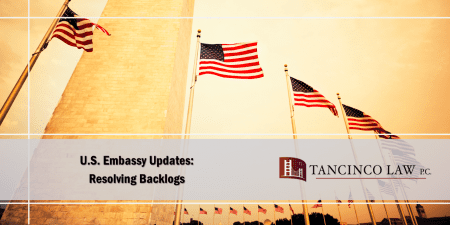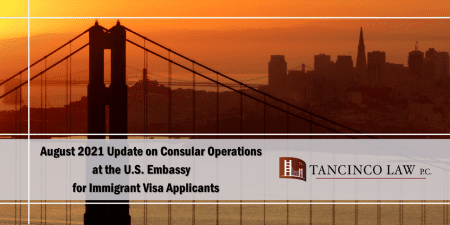As most U.S. government agencies resume operation, Tancinco Law, P.C. compiles a summary of what you need to know about your immigration petitions pending with different offices. In addition, we also have described travel restrictions imposed in the Philippines and the United States as it relates to a Filipino/American citizen traveler.
U.S. CITIZENSHIP AND IMMIGRATION SERVICE (USCIS)
Emergency Services
On June 4, 2020, the local U.S. Citizenship and Immigration Services announced that their local offices have re-opened for non-emergency in person services. As of this writing, USCIS is only scheduling local InfoMod appointments. These are cases where the individual has an emergent need such as ADIT stamp or proof of lawful residence and issuances of advance parole. Physical interview schedules or rescheduled on immigrant benefit applications are yet to be mailed. Slowly USCIS will safely resume in person services. Those who need emergency document services may make an appointment www.uscis.gov/contactcenter or call 1 800-375-5283. There will be no entry for those with no appointments. No walk in visits at the USCIS.
Naturalization: Oath Taking Ceremonies
Notices of rescheduled oath taking ceremonies will be mailed out. So those who passed their citizenship tests and are waiting to take their oath will soon receive notices. As USCIS safely resumes in-person services, some naturalization ceremonies may be conducted differently than in the past. You may receive supplemental information from USCIS that provides detailed instructions for your ceremony.
Biometrics
USCIS announced that in certain cases, it will issue notifications of biometrics reuse to eligible individuals instead of coming to the Application Support Center for biometrics. For those not eligible for the reuse of biometrics, notices of new schedule will soon be mailed on their cancelled biometrics appointments. If you do not receive notification of biometrics or appointments within 90 days of USCIS opening, you may call 1-800-375-5283.
DEPARTMENT OF STATES: CONSULAR PROCESSING
NATIONAL VISA CENTER (NVC)
Applications and submissions of documents with the National Visa Center’s online platform ,CEAC, is fully operational.
As of June 1, 2020, the National Visa Center will no longer accept or respond to inquiries through mail. Inquiries including urgent medical or humanitarian situations are to be submitted through a Public Inquiry Form at https://nvc.state.gov/inquiry. As of June 1, 2020, NVC is responding to inquiries received on May 23, 2020.
Documents will only be mailed if there are explicit instructions from the National Visa Center to do so and those instructions were received through email, telephone call or letter from the National Visa Center.
Beneficiaries of visa petitions are reminded of the “one year contact” requirement that they should apply for the immigrant visa within one year of notice of visa availability or risk termination of the registration or revocation of the visa petition.
U.S. EMBASSY IN MANILA
The Department of State announced that each post will reopen on their own timeline based on the situation in the respective country.
On Visa Applications and Interviews:
As per June 8, 2020 communication with the U.S. Embassy in Manila the following response was provided:
The U.S. Embassy in the Philippines has canceled all immigrant and nonimmigrant visa interviews scheduled through July 3 due to the Philippines’ community quarantine measures to reduce the spread of COVID-19.
We will resume routine visa services as soon as possible but are unable to provide a specific date at this time. We appreciate your patience and understanding.
After the community quarantine is lifted in Metro Manila, all affected applicants should reschedule their visa interviews through the Embassy call center by phone at +63 (2) 7792-8988 or +63 (2) 8548-8223, or through the online appointment system at ustraveldocs.com/ph.
There is no fee to change an appointment and visa application fees are valid for one year in the country where the fee was paid.
With no specific date and time to reopen, all visa applicants who wish to reschedule their interview may call the phone numbers provided or go online and access the U.S. Embassy’s online appointment system.
On Expired Visa and Inability to Travel Because of COVID-19
If a visa has been issued but the applicant cannot travel, the U.S. Embassy in Manila when it opens may be able to reprint a visa foil if the underlying documents have not expired. Where the documents expire while waiting to be able to travel to the U.S. the applicant will be required to obtain new documents.
IMMIGRATION COURTS
The immigration judges continue to hear cases of individuals who are in detention.
On Monday, June 15, 2020, Honolulu Immigration Court will resume hearings for non detained cases.
For individuals within the jurisdiction of Boston, Buffalo, Dallas, Hartford, Las Vegas, Memphis and New Orleans, immigration court hearings for non-detained cases will resume on Monday June 29, 2020. In all other immigration courts outside of those mentioned, hearings are postponed through and including Friday June 26, 2020. Those with hearing notices scheduled on or before June 26, 2020 will receive new Notices of Hearing. It is more important to check with your legal counsel about the status of your hearing with the immigration court so as not to miss your hearing dates.
IMMIGRATION & CUSTOMS ENFORCEMENT (ICE)
ICE Arrests
ICE maintains that in light of the ongoing COVID-19, the agency adjusted its enforcement posture beginning March 18, 2020 and limited arrest to those cases that are with highest priorities to promote life saving and public safety activities. Note that this does not mean that they are suspending arresting individuals with criminal history or those subject to mandatory detention.
ICE emphasized that it shall abide by its sensitive locations policy during the COVID-19 crisis and will not carry out enforcement operations at or near health care facilities, such as hospitals, doctors offices, accredited health clinics & emergent or urgent care facilities. Note though that ICE agents are present during protests despite the fact that these are considered sensitive locations. Unauthorized immigrants including DACA recipients joining the rallies/protests must be aware of their rights should they be taken into custody.
ICE Check Ins
Individuals required to report regularly to ICE for in person check-ins have been allowed to do so through alternative means. As of April 17, 2020, the in-person reporting has been temporarily suspended. However, individuals who are subject to the reporting requirement in lieu of detention/removal are still mandated to report either by calling or telephone check ins. For stays of removal applications, ICE-ERO will accept I-246 by mail.
TRAVEL TO THE PHILIPPINES AND UNITED STATES
Travel to the Philippines
Under existing guidelines, arriving U.S. citizens or non Filipinos are still not allowed to enter the Philippines even after 31 May 2020. Only OFWs, Foreign nationals married to Philippine citizens including their dependent children and foreign diplomats are allowed to enter the country.
All non-Filipinos who intend to depart the country can leave anytime. Filipinos are not allowed to leave unless they are OFWs, permanent residents, or holders of student visas in their countries of destination.However, they may have challenges in booking a flight as most of the international flights remain suspended.
Passengers Not Subject to the Restrictions and Who Are Arriving in the Philippines Subject to Mandatory Quarantine
All travelers to Manila will undergo the usual thermal scan upon arrival. If a passenger is showing symptoms of the COVID-19, s/he will undergo a real-time polymerase chain reaction (RT-PCR) test. Travelers whose test results are positive will be transferred to a designated hospital for further medical management.
Those who do not have symptoms will undergo a mandatory quarantine where a baseline rapid test will be conducted. While waiting for the results, passengers must stay in either a government designated quarantine facility or in a Bureau of Quarantine approved quarantine hotel for 14 days.
After quarantine is completed, individuals may go about their travel plans subject to quarantine protocols of the local government of their destination.
Filipinos who are not OFWs and Non-Filipinos will shoulder their own payment for the accommodation.
Traveling to the United States
Philippine citizens are not banned from entering the United States as long as they have valid U.S. temporary or permanent resident visas. Those who traveled internationally in the past 14 days and return to the United States, they are required to self quarantine, stay home and monitor their health.
Unless the traveler is a U.S. citizen or a permanent lawful resident (green card holder), s/he will be banned from entering the U.S. if s/he traveled from the following countries: China, Hong Kong and Macau, Iran, the UK and Ireland Schengen area which encompasses the following 26 European Countries: Austria, Belgium, Czech Republic, Denmark, Estonia, Finland, France, Germany, Greece, Hungary, Iceland, Italy, Latvia, Liechtenstein, Lithuania, Luxembourg, Malta, Netherlands, Norway, Poland, Portugal, Slovakia, Slovenia, Spain, Sweden, and Switzerland.
U.S. citizens and lawful permanent residents of the United States, certain family members, and other individuals who meet specified exceptions who have been in one of the countries listed above in the past 14 days will be allowed to enter the United States through on of these airports:
- Boston-Logan International Airport (BOS), Massachusetts
- Chicago O’Hare International Airport (ORD), Illinois
- Dallas/Fort Worth International Airport (DFW), Texas
- Detroit Metropolitan Airport (DTW), Michigan
- Daniel K. Inouye International Airport (HNL), Hawaii
- Fort Lauderdale-Hollywood International Airport (FLL), Florida
- George Bush Intercontinental Airport (IAH), Texas
- Hartsfield-Jackson Atlanta International Airport (ATL), Georgia
- John F. Kennedy International Airport (JFK), New York
- Los Angeles International Airport, (LAX), California
- Miami International Airport (MIA), Florida
- Newark Liberty International Airport (EWR), New Jersey
- San Francisco International Airport (SFO), California
- Seattle-Tacoma International Airport (SEA), Washington
- Washington-Dulles International Airport (IAD), Virginia
After arriving in the United States from one of these countries, CDC recommends that travelers stay home and monitor their health for 14 days.
(Lourdes Santos Tancinco, Esq is a partner at the Tancinco Law P.C. Her office is located at One Hallidie Plaza, Ste 818, San Francisco CA 94102 and may be reached at 1-888-930-0808; email at law@tancinco.com, www.facebook.com/tancincolaw or check their website at tancinco.weareph.com/old.)



